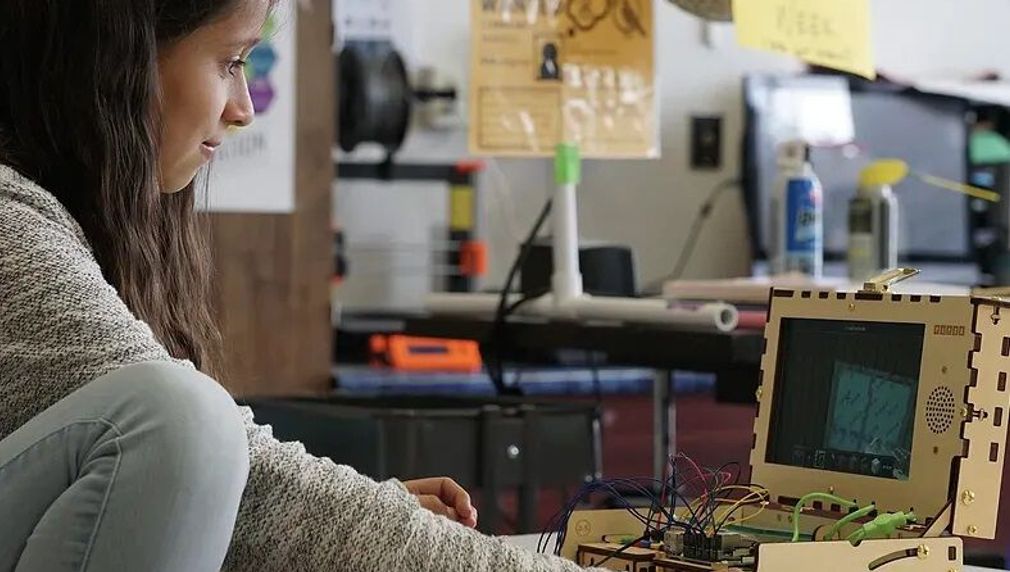The Engineer Factory
The mission of the Engineer Factory is to strengthen the K-12 STEM education pipeline and increase the number of African American, Latinx and female students from underserved communities who pursue degrees and careers in Engineering and STEM. This is accomplished through: project-based learning ; coaching of competition-ready teams; culturally responsive math support; professional development for K-6 educators; exposure and linkages to the engineering industry; and by awarding scholarships to deserving high school seniors.

In which areas of Los Angeles will you be directly working?
South LA
South Bay
What is the problem that you are seeking to address?
COVID-19 has revealed that technology and computer science is ubiquitous. However, computer literacy is still often confused with computer science. While computer literacy refers to word processing and use of the Internet, computer science refers to the study of algorithmic processes, hardware and software designs, and ways to impact society with technological innovation. People with coding skills are not only being hired in the tech industry, but in fields like journalism, entertainment, and health care, too. But not teaching computer science to minority, immigrant and low-income students keep them behind wealthier students who’ve had the opportunity to learn it much earlier on. Engineer Factory has worked with Inglewood USD for five years. Currently NOT ONE middle or high school in the district offers computer science courses. Lack of access to computer science instruction places Inglewood students at a disadvantage when competing for employment opportunities in the 21st century.
Describe the project, program, or initiative that this grant will support to address the problem identified.
The Engineer Factory is partnering with Piper to introduce Inglewood and South LA students to computer science and hopefully put them on a STEM track. The Engineer Factory will conduct an eight-week, 32-hour Piper course for at least 500 Inglewood middle and high school students to introduce them to computer science. The Piper five phase learning experience meets science standards and upon completion of the five phases, students will earn micro credentials issued by UC San Diego Extension. The five Piper Computer Phases include: Phase 1: Build the Piper Computer – Students will explore physical connections of computer components, construct a model of a working computer system, practice troubleshooting and perseverance skills. Phase 2: Discover Electronics – Complete levels in Piper’s custom Raspberry Pi Edition of Minecraft to learn about circuits, inputs, outputs, breadboard, wiring, buttons, switches, buzzers, and LEDs. Phase 3: Learn to Code – Follow project tutorials to code for physical devices in the block-based language, Blockly, and learn foundational computer science principles like loops, sequences, and events. Phase 4: Extend with Design Thinking –Students are challenged to design and create their own solution to a real-world challenge and explore making. Phase 5: Deconstruct & Reflect – Disassemble the Piper Computer Kit and take inventory to ensure all the parts are in the box for reuse by future students.
In what stage of innovation is this project, program, or initiative?
Expand existing project, program, or initiative
Approximately how many people will be impacted by this project, program, or initiative?
Direct Impact: 550
Indirect Impact: 5,000
Describe how Los Angeles County will be different if your work is successful.
The pandemic has revealed that computer and innovative uses of technology is what has kept the world moving. Computer science is needed in all industries—healthcare, education, business, and entertainment. It is imperative that students in underserved communities are no longer relegated to being consumers of technology, but also producers. We believe that the next Zuckerberg or Musk or Katherine Johnson is in a classroom or playground in Inglewood or another underserved community. The Engineer Factory Piper Computing Program is step one in what we plan to be a comprehensive computer science learning path in underserved communities. We will build upon this program with additional classes in computer hardware and software. Engineer Factory will fill a gap the education system and prepare them to thrive in the 21st century workforce. When proven successful, our program can be replicated to other underserved communities.
What evidence do you have that this project, program, or initiative is or will be successful, and how will you define and measure success?
Engineer Factory will measure the impact of the Piper Computing Program in a variety of ways: 1. The Piper Computing System aligns with multiple science standards: the California Computer Science Standards and Next Generation Science Standards (NGSS); Computer Science Teachers K-12 Computer Science Standards;, and California Common Core State Standards. There are “exit tickets” built into the system to ensure the lesson was understood and learned. 2. We will deem students successful for completing the building of the laptop if it functions. Students will also have the capacity to troubleshoot and to create their own “hacks”. 3. If students complete the five (5) Piper phases and meet the requirements to earn the micro credential from UCSD. Engineer Factory strives to have 90% of our students earn this credential. 4. Impact is further measured if students continue to participate in other Engineer Factory STEM and particularly computer science activities/classes.
Describe the role of collaborating organizations on this project.
Engineer Factory will provide program oversight and implementation. Piper Computers will provide discounted computer kits; train Engineer Factory on Piper curriculum and make recommendation of Piper curriculum playlist required to meet the UCSD Micro credential; provide technical assistance; and facilitate the awarding of the UCSD micro credential. Homeboy Refurbishing will train the Engineer Factory staff and provide technical assistance during the program. They will also invite some of their students to share their experiences and best practices.
Which of the LEARN metrics will you impact?
Enrollment in afterschool programs
Proficiency in STEM